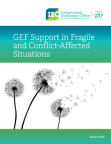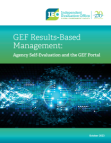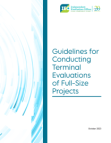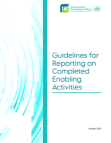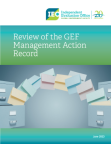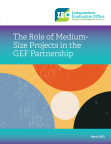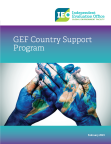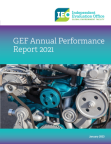With the selected criteria you have 31 - 40 of 209 results.
LDCF/SCCF Annual Evaluation Report (AER) 2023
Status: Published | Last updated on:
Evaluation:
English
Evaluation of GEF Support in Fragile and Conflict-Affected Situations
Status: Published | Last updated on:
Evaluation:
English
GEF Results-Based Management (RBM): Agency Self-Evaluation and the GEF Portal
Status: Published | Last updated on:
Evaluation Grouping: Institutional
Evaluation:
English
Guidelines for Conducting Terminal Evaluations of Full‑Size Projects 2023
Status: Published | Last updated on:
Evaluation Grouping: Performance, Institutional, Policies & Guidelines
Evaluation:
English
Guidelines for Conducting Program Evaluation 2023
Status: Published | Last updated on:
Evaluation Grouping: Performance, Institutional, Policies & Guidelines
Evaluation:
English
Guidelines for Reporting on Completed Enabling Activities 2023
Status: Published | Last updated on:
Evaluation Grouping: Performance, Institutional, Policies & Guidelines
Evaluation:
English
Review of the GEF Management Action Record (MAR)
Status: Published | Last updated on:
Evaluation Grouping: Performance, Institutional
Evaluation:
English
The Role of Medium-Size Projects (MSP) in the GEF Partnership 2020
Status: Published | Last updated on:
Evaluation Grouping: Performance, Institutional
Evaluation:
English
GEF Country Support Program (CSP)
Status: Published | Last updated on:
Evaluation Grouping: Institutional
Evaluation:
English
GEF Annual Performance Report (APR) 2021
Status: Published | Last updated on:
Evaluation Grouping: Performance
Evaluation:
English

